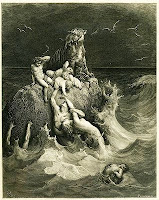The folks from Good News Week are pretty well known for their low tolerance of religion in most of its forms. This week on their website, they've dedicated their 2009 awards section to religion and there are four candidates (from the Pope to an Islamic magazine) copping their ire here this week. Click here to take a look (then just scroll down a little bit)...
These guys think religion is silly and have picked a few good examples here to back up their case - as most people who don't like religion tend to do. For those of us who are spiritual and religious, we need to do our best not to give people so much ammunition to back up their case. We need to stop being silly because of our religion! Anyway...
 I'm reminded that Jesus also thought that a lot of religion was silly or that any kind of religion could make you silly if you let it. When he told the story about the Good Samaritan (Luke 10:25-37), he cast the first two characters as religious people who, upon seeing a wounded man lying beaten, robbed and dying at the side of the road, walked on passed because they had important religious things to do. They missed what a lot of normal (meaning "not religious") people would not have missed - that this person was hurt and in danger, and in need of help. Religion can make people silly. It can make them not see what is obviously going on around them and miss out on doing something important that could really make a difference.
I'm reminded that Jesus also thought that a lot of religion was silly or that any kind of religion could make you silly if you let it. When he told the story about the Good Samaritan (Luke 10:25-37), he cast the first two characters as religious people who, upon seeing a wounded man lying beaten, robbed and dying at the side of the road, walked on passed because they had important religious things to do. They missed what a lot of normal (meaning "not religious") people would not have missed - that this person was hurt and in danger, and in need of help. Religion can make people silly. It can make them not see what is obviously going on around them and miss out on doing something important that could really make a difference.
These guys think religion is silly and have picked a few good examples here to back up their case - as most people who don't like religion tend to do. For those of us who are spiritual and religious, we need to do our best not to give people so much ammunition to back up their case. We need to stop being silly because of our religion! Anyway...
 I'm reminded that Jesus also thought that a lot of religion was silly or that any kind of religion could make you silly if you let it. When he told the story about the Good Samaritan (Luke 10:25-37), he cast the first two characters as religious people who, upon seeing a wounded man lying beaten, robbed and dying at the side of the road, walked on passed because they had important religious things to do. They missed what a lot of normal (meaning "not religious") people would not have missed - that this person was hurt and in danger, and in need of help. Religion can make people silly. It can make them not see what is obviously going on around them and miss out on doing something important that could really make a difference.
I'm reminded that Jesus also thought that a lot of religion was silly or that any kind of religion could make you silly if you let it. When he told the story about the Good Samaritan (Luke 10:25-37), he cast the first two characters as religious people who, upon seeing a wounded man lying beaten, robbed and dying at the side of the road, walked on passed because they had important religious things to do. They missed what a lot of normal (meaning "not religious") people would not have missed - that this person was hurt and in danger, and in need of help. Religion can make people silly. It can make them not see what is obviously going on around them and miss out on doing something important that could really make a difference.Richard Dawkins - the world's most famous atheist - has often quoted Nobel prize winning physicist Steven Weinberg, who said, "With or without [religion] you’d have good people doing good things and evil people doing evil things. But for good people to do evil things, it takes religion." This is a pretty stinging criticism of religion, but one that is not too difficult to find many cases that back it up.
We need to come back to what the Bible says about worthwhile religion; that, "Religion that God our Father accepts as pure and faultless is this: to look after orphans and widows in their distress and to keep oneself from being polluted by the world." (James 1:27). I think that this kind of religion is not only the kind that God would find "pure and faultless", but that others would find hard to fault and poke fun at as well. Let's make sure we keep "the main thing, the main thing" here.
Let's see people make fun of that...
Shalom...
We need to come back to what the Bible says about worthwhile religion; that, "Religion that God our Father accepts as pure and faultless is this: to look after orphans and widows in their distress and to keep oneself from being polluted by the world." (James 1:27). I think that this kind of religion is not only the kind that God would find "pure and faultless", but that others would find hard to fault and poke fun at as well. Let's make sure we keep "the main thing, the main thing" here.
Let's see people make fun of that...
Shalom...





